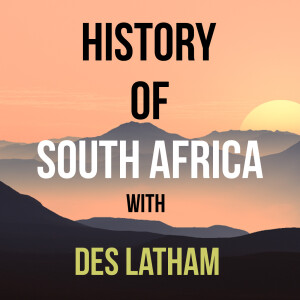
History of South Africa podcast
History

Episode 111 - Harry Smith arrives in panic-stricken Grahamstown in January 1835 and stiffens settler spines
 2023-03-26
2023-03-26
Download
Right click and do "save link as"
ON December 21st 1834 at least ten thousand warriors under Maqoma and Thyali swept all before them as they raided deep into the Cape colony, across a wide front.
Fort Beaufort and Fort Willshire were the main centre of British operations to the north of Grahamstown as the war began. Fort Beaufort was particularly strategic because of its proximity to the Kat River Settlement.
The amaXhosa avoided attacking this Settlement but that was going to change. They were hoping that the Khoekhoe would rise up alongside the amaXhosa and defeat the settlers, but the Khoekhoe and the amaXhosa had a far longer tradition of competition over land and resources. This was far more deeply etched into the narrative of both people’s than the simple colour of skin debate.
Smaller centres such as Bathurst and Salem closer to the coast were also coming under attack, situated between Grahamstown and the sea, or a possible escape route for the settlers and the Boers who could not keep fighting inland. When the British had established the 1820 Settlers, they had densely parcelled these farms together as a forward barriers against the Xhosa who may advance across the Fish River.
And now the amaXhosa were advancing across the Fish River but over the last 14 years, the military presence and preparation here had dwindled and the settler unpreparedness for war was almost total. Betrand Bowker wrote scathingly of how the settlers of the Lower Albany region had “scarcely any guns and most of them who did, did not know how to shoot … just us brothers and a few others…”
So it was on the sixth day that Sir Harry Smith galloped into town, his 600 mile epic ride at an end but his mission just beginning.
When he’d passed a rider hurrying to Cape Town from the frontier, he read the letters and was horrified to read Somerset’s suggestions that Grahamstown be abandoned. When he arrived in that town on the evening of the 6th, he noted the chaotically arranged barricades and he thought it a helpless muddle.
He was fresh enough to fight a battle, and his eyes were waspishly alert as Noel Mostert notes - what he saw struck him as ridiculous - so ridiculous that he almost burst out laughing as he rode through town such was the higgledy piggedly nature of the sandbags et al.
He didn’t laugh out aloud because watching him were men and women - the settlers - who’d lost family members and who’d lost everything. The town was overcome with melancholy, with consternation. But what made Smith really angry was the unmilitary appearance of the settlers, who he said were “shuffling about like an Irish mob at a funeral…” their firearms slung about their bodies, swords stuffed into belts.
view more
Fort Beaufort and Fort Willshire were the main centre of British operations to the north of Grahamstown as the war began. Fort Beaufort was particularly strategic because of its proximity to the Kat River Settlement.
The amaXhosa avoided attacking this Settlement but that was going to change. They were hoping that the Khoekhoe would rise up alongside the amaXhosa and defeat the settlers, but the Khoekhoe and the amaXhosa had a far longer tradition of competition over land and resources. This was far more deeply etched into the narrative of both people’s than the simple colour of skin debate.
Smaller centres such as Bathurst and Salem closer to the coast were also coming under attack, situated between Grahamstown and the sea, or a possible escape route for the settlers and the Boers who could not keep fighting inland. When the British had established the 1820 Settlers, they had densely parcelled these farms together as a forward barriers against the Xhosa who may advance across the Fish River.
And now the amaXhosa were advancing across the Fish River but over the last 14 years, the military presence and preparation here had dwindled and the settler unpreparedness for war was almost total. Betrand Bowker wrote scathingly of how the settlers of the Lower Albany region had “scarcely any guns and most of them who did, did not know how to shoot … just us brothers and a few others…”
So it was on the sixth day that Sir Harry Smith galloped into town, his 600 mile epic ride at an end but his mission just beginning.
When he’d passed a rider hurrying to Cape Town from the frontier, he read the letters and was horrified to read Somerset’s suggestions that Grahamstown be abandoned. When he arrived in that town on the evening of the 6th, he noted the chaotically arranged barricades and he thought it a helpless muddle.
He was fresh enough to fight a battle, and his eyes were waspishly alert as Noel Mostert notes - what he saw struck him as ridiculous - so ridiculous that he almost burst out laughing as he rode through town such was the higgledy piggedly nature of the sandbags et al.
He didn’t laugh out aloud because watching him were men and women - the settlers - who’d lost family members and who’d lost everything. The town was overcome with melancholy, with consternation. But what made Smith really angry was the unmilitary appearance of the settlers, who he said were “shuffling about like an Irish mob at a funeral…” their firearms slung about their bodies, swords stuffed into belts.
More Episodes
012345678910111213141516171819
Create your
podcast in
minutes
- Full-featured podcast site
- Unlimited storage and bandwidth
- Comprehensive podcast stats
- Distribute to Apple Podcasts, Spotify, and more
- Make money with your podcast
It is Free
- Privacy Policy
- Cookie Policy
- Terms of Use
- Consent Preferences
- Copyright © 2015-2024 Podbean.com





